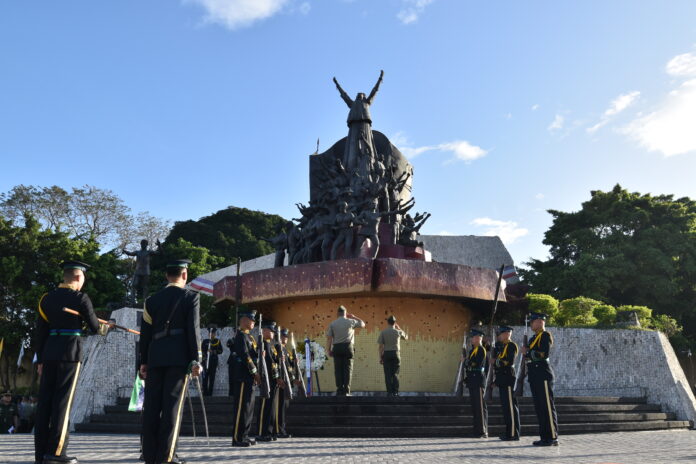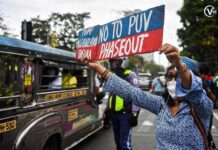
THE SIGNIFICANCE of observing the People Power anniversary is being overshadowed by holiday economics this year, as President Ferdinand “Bongbong” Marcos Jr., son of the late dictator ousted in the 1986 uprising, has excluded Feb. 25 from the list of nationwide holidays for 2024.
With Marcos Junior removing Feb. 25, the date in 1986 that concluded the four-day revolt leading to the overthrow of the Marcos dictatorship, from the list of nationwide holidays for 2024, historians are concerned about its potential impact on the public’s understanding of historical events.
Thomasian historian Jose Victor Torres said moving historical dates for economic reasons was not justifiable.
“That kind of defeats the purpose actually of valuing the historical date,” he told the Varsitarian, “because you just don’t value the date. You also value the day and the time and the period in which the historical event was made.”
Since Corazon Aquino’s presidency, all presidents except Marcos Junior have declared Feb. 25 as a special non-working holiday to commemorate the historic event.
Prof. Melanie Turingan, dean of the Faculty of Arts and Letters and a historian, suggested that the decision made by the dictator’s son reflects his intention to conceal his family’s wrongdoing during the EDSA Revolution from the Filipino people.
“If you change [the date of the holiday], or give less importance to it, it’s just one way of showing that first, you are against it,” she told the Varsitarian. “Second, that you want to withhold something you are involved in.”
Torres stressed that holidays hold significance beyond merely being days off.
“It is a way of remembering the value ng history natin sa ating pangkaraniwang buhay ngayon because these are events of the past, and the only way to remember the events of the past is also to remember the date,” he said.
“Nagiging mukhang pera ‘yong pagka-unawa ng ating mga holiday [and] how they are part of our culture.”
Six moments in history have been designated as non-working holidays under the law. These include the birth of revolutionary leader Andres Bonifacio, the death of national hero Dr. Jose Rizal, the declaration of independence from the Spaniards, and the assassination of former senator Ninoy Aquino.
Torres said understanding the significance of these holidays is integral to understanding the identity of the nation.
“History has always played a large part in the creation of our nation,” he said. “And you have to remember that in the creation of a nation, we have to consider the creation of our identity as Filipinos.”
Moving holidays, according to Torres, contributes to what he describes as the nation’s “historical ignorance.”
This is exemplified by incidents such as the viral “MaJoHa” issue, where two housemates on the reality show “Pinoy Big Brother” were unable to correctly refer to the three priests executed in 1872 after being found guilty of sedition and treason by Spanish authorities. The correct reference is GomBurZa, which is short for Filipino priests Mariano Gomez, Jose Burgos and Jacinto Zamora.
“Changing these dates has dangerously contributed to historical ignorance because ironically, with the rise of information technology, with the availability and the accessibility of our information because of the computer or because of the internet, it created a certain ignorance or flaw in our understanding of history,” Torres said.
Turingan said the government’s lack of emphasis on events that shaped the Filipino identity could result in diminished historical and cultural consciousness among Filipinos.
“The ‘kamalayan’ of the Filipinos in terms of our significant past is very shallow. That’s why there is no weight or depth in terms of how they give importance to that,” Turingan said.
Assoc. Prof. Augusto De Viana, former head of UST Department of History, suggested that the government and other institutions should use holidays to generate interest, particularly among the youth, in important figures from the nation’s centuries-long story.
“Sa akin talaga, hindi mo dapat ginagalaw ‘yan at saka trabaho ng ating mga cultural agencies na buhayin [ang kasaysayan] at gumawa ng mga programa para sa kaalaman ng mga tao,” De Viana told the Varsitarian.
“It will harm historical consciousness. It will also harm people’s values. It shows that we value money rather than the memory of this person, what this person stood for.”
‘Holiday economics’
Malacañang defended its decision to exclude the People Power commemoration from the 2024 holidays list by stating that while it respects the spirit of the event, it fell on a Sunday, which coincides with the “rest days for most workers or laborers” and has “minimal socio-economic impact.”
In 2023, Marcos declared Feb. 24 as a special non-working holiday, citing the “principle of holiday economics,” which “enables our countrymen to avail the benefits of a longer weekend.”
According to Assoc. Prof. Alain Jomarie Santos of the UST Research Center for Social Sciences and Education, holiday economics aims to bring national holidays closer to long weekends “to encourage travel and increase tourism.”
“By giving workers and students more opportunities to unwind and spend time with their loved ones, an increase in extended weekends can help lower stress, minimize burnout and promote work-life balance,” Santos told the Varsitarian. “That would result in maximum productivity that will be advantageous for the business.”
“I think it doesn’t matter when a specific historical event or individual is recognized as long as we can inculcate a sense of patriotism or essential ideals in each other.”
Marcos Junior’s ability to change the holiday stems from the fact that the EDSA holiday was established not by law but through an executive order. This means that presidents have the discretion to declare it a holiday or not.
However, he often justifies these changes by citing holiday economics. This rationale also led him to move the commemorations of Araw ng Kagitingan (Day of Valor) from April 9 to April 10 and Bonifacio Day from Nov. 30 to Nov. 27 last year.
Albay Rep. Joey Salceda, chair of the House Committee on Ways and Means, said in 2023 that with holiday economics translating to longer weekends, domestic tourism could go up by 10 percent and add more value to certain industries, citing an analysis of input-output tables by the Philippine Statistics Authority.
“As long as Marcos limits the number of holidays and focuses holiday economics on just keeping holidays next to each other, the policy should be very beneficial,” he told reporters in January 2023.
Former president Gloria Macapagal-Arroyo popularized the term “holiday economics” during her nine-year tenure. She twice moved the Edsa holiday, in 2009 and 2010, but only for schools.
Holiday economics became a government policy in 2007 when Arroyo signed Republic Act 9492, allowing presidents to declare holidays that fall on a Wednesday or Sunday to the closest Monday.
But the Makati Business Club (MBC) warned in its 2014 Congress Watch Report, citing the Department of Labor and Employment’s Institute for Labor Studies, that holiday economics might not be beneficial at all.
“A possible reason cited is the tendency of firms to avoid incurring higher employee compensation costs should they continue to operate during holidays,” its report stated.
“Furthermore, despite the opportunity for an additional vacation day, potential local tourists may be constrained by other pressing factors such as the financial and time costs of transportation, a locality’s peace and order situation, and the low level of disposable income.”
In the first place, non-working holidays, the MBC contended, lessen productivity and swell costs because businesses need to pay higher rates for their employees. Industries that are always affected include business process outsourcing because they primarily cater to foreign clients.
“For companies that cannot afford to have a day off in their operations, this means higher production costs since the law provides for a premium for work performed on a rest day and special days,” the report stated.
To bolster Filipinos’ sense of patriotism and respect for heroes, Marcos declared 2023 to 2033 as the “Dekada ng Kasaysayan ng Pilipinas” in anticipation of the National Historical Commission of the Philippines’s 100th anniversary in 2033.
Historians are clear on the consequences of holiday economics: it defeats the purpose of the holiday itself. They emphasized that the government must improve its efforts to preserve the sanctity of history.
“It sends a very unfavorable message to the youth that you can just tinker with a historical date just for the sake of tourism, for the sake of money,” De Viana said.
“You’re moving the holiday so that the local tourism will be benefited,” he said. “But at what cost? ‘Yong cost ng ating historical consciousness. ‘Yong cost ng ating kaluluwa. So ayun, nakakalungkot.” Ralent M. Penilla


















